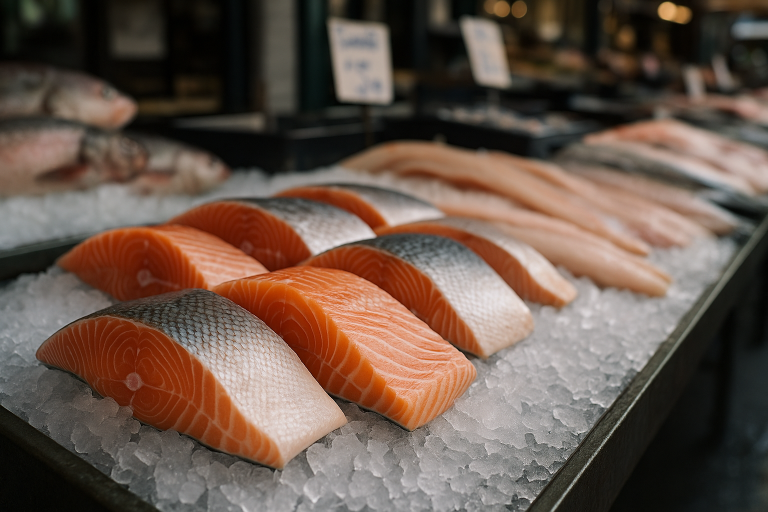Essential Vitamins For Carnivore Dieters: What You Might Be Missing
Wondering why you feel off on a carnivore diet? A diet of only meat can miss some key vitamins. This post will show you what supplements for carnivore diet might help. Keep reading to feel better!
Why Vitamins Are Important for Carnivore Dieters

Vitamins keep our bodies working right, like tiny workers fixing and building stuff inside us. For folks eating only meat on the carnivore diet, missing out on certain vitamins can lead to trouble.
Imagine your body is a car; without the right fuel and oil (in this case, vitamins), it won’t run smoothly. This diet focuses heavily on meat, but some essential nutrients might not be in big enough amounts in meat alone.
That’s why paying attention to what might be missing is key.
Even on a carnivore diet, balance is important – it’s not just about what you eat but also what you might not be getting enough of.
People often think eating lots of meat covers all their nutritional needs. However, without veggies or fruits, they could miss out on vitamin C and fiber. These aren’t just good for avoiding scurvy like pirates back in the day; they’re crucial for overall health today.
So, adding some specific vitamins or supplements can help fill these gaps and keep that bodily car running without a hitch.
Essential Vitamins and Nutrients You Might Be Missing
Jumping on the carnivore diet train? Cool, but watch out! Your body might be missing out on some key players like Vitamin C and Magnesium. Keep reading to make sure you’re not letting any essentials slip through the cracks.
Vitamin C
Vitamin C is a big deal for people eating only meat. This vitamin stops you from getting sick and helps your body heal wounds. Meats, especially beef liver, have some Vitamin C, but not as much as fruits and vegetables.
To avoid missing out, carnivore dieters need to think about how to get enough of it.
Some folks turn to organ meats like liver because they pack more Vitamin C than muscle meats. Others might choose supplements to make sure they’re covering their bases. Either way, keeping an eye on Vitamin C intake is key for staying healthy on a carnivore diet.
Vitamin K2
Vitamin K2 is often overlooked, but it’s a star player for anyone eating mostly meat. This vitamin helps put calcium in the right spots, like your bones, and keeps it out of places it shouldn’t be, such as your arteries.
Think of Vitamin K2 as the traffic cop of your body, directing calcium where to go. It’s key for strong bones and healthy hearts.
Most folks get Vitamin K1 from plants and think they’re covered. However, carnivore dieters need to focus on K2 since they might not eat many greens. You can find this essential nutrient in foods like high-fat dairy products, egg yolks, and liver.
So yes, that cheese platter you love? It’s doing more than just satisfying your taste buds; it’s giving you a much-needed dose of Vitamin K2.
Vitamin K2: Not all heroes wear capes; some help direct calcium.
Magnesium
Magnesium is a key player for anyone on a carnivore diet. This nutrient helps with muscle and nerve function, blood sugar levels, and making protein. Many people don’t get enough magnesium, which can lead to feeling tired or weak.
Meats do have magnesium, but the amounts are often lower than what your body needs.
Next up is potassium. This mineral works hand in hand with sodium to help keep your body’s water balance just right.
Potassium
Potassium is vital for those on a carnivore diet. Your body requires it for the appropriate functioning of your heart and smooth movement of your muscles. However, here’s the fact: consuming solely meat may not provide you with sufficient amounts of this essential nutrient.
Consider it analogous to fueling a car; without potassium, your body can’t perform optimally. Many people assume bananas are the primary source for potassium, but rest assured, there are meat alternatives as well.
For example, salmon and beef contain potassium. Avocados also have potassium if you’re willing to incorporate some plant-based food occasionally. It’s somewhat of a double benefit—obtaining your protein while also maintaining your potassium level.
Just keep track of the various nutrients different foods can provide to maintain energy and health on a carnivore diet.
Fiber Alternatives
Fiber might be challenging on a carnivore diet because, clearly, meat doesn’t have any. But, who says you can’t identify other methods to ensure smooth functioning? Be creative with different options like chia seeds and flaxseeds.
These are low in carbs and also high in omega fatty acids, making them a solid selection for anyone wishing to stay true to their meat-based lifestyle while gaining those necessary nutrients.
Improve your diet with fiber alternatives; it’s a matter of maintaining equilibrium.
Also, we should discuss electrolyte supplements. They can bridge some significant gaps without violating the carnivore principles. Magnesium and potassium are vital for muscle function and hydration, but aren’t found in ample amounts in animal products.
Adding these to your diet can help ward off cramps and maintain energy levels. Just make an informed choice — prioritize quality over quantity every time to derive the maximum nutritional value.
Role of Organ Supplements in Filling Nutritional Gaps
Organ supplements are like secret weapons for carnivore dieters, sneaking in those nutrients you might be missing. They pack a powerful punch, helping to bridge the gap and keep your body humming along.
Liver and Other Organ Supplements
Liver and other organ supplements pack a real punch for those on a carnivore diet. They fill in nutritional gaps you might not even know you have.
- Liver is like nature’s multivitamin. It contains vitamin A, B vitamins, iron, and copper. People say it’s good for your energy levels.
- Heart supplements are high in CoQ10. This helps with heart health and energy.
- Kidney supplements give you selenium and B12. This combo supports your immune system.
- Brain supplements are rich in omega-3 fatty acids and cholesterol. Good for brain health.
- Spleen supplements offer a good source of iron and vitamin B12. They can help boost your red blood cell count.
- Grass-fed organ supplements usually have more nutrients than those from grain-fed animals. They’re considered cleaner too.
- Some people use bone marrow for its healthy fats and support for bones and joints.
- Thymus may support immune function because it provides peptides important for immunity.
Choosing organ supplements from grass-fed animals is smarter since they tend to be leaner and richer in certain nutrients. Always check the source of your supplements to ensure they meet your dietary standards.
Benefits of Grass-Fed Organ Supplements
Grass-fed organ supplements come packed with more benefits than their conventional counterparts. They have higher levels of omega fatty acids and antioxidants. These nutrients are vital for your heart health and fighting off diseases.
Grass-fed sources also boast a richer profile of vitamins and minerals.
Choosing grass-fed means you’re going for the gold standard in nutrient intake. Animals raised on grass diets absorb more essential vitamins from their natural diet, passing these benefits directly to you through their organs.
This way, your body gets a boost in nutrition that’s hard to match with other supplements or even a strict carnivore diet alone.
How to Choose the Right Supplements for Carnivore Diets
Picking the right supplements for a carnivore diet isn’t like finding a needle in a haystack, but it’s close. You want to grab those that match your diet’s groove, ensuring they’re top-notch and come from sources you trust.
Prioritize Quality and Sourcing
Choosing the right supplements means looking where they come from and how they’re made. Good quality is a must for getting the benefits you need. Go for supplements that are clear about their sourcing.
Grass-fed organ supplements, for example, often have more nutrients than those from animals raised in other ways.
Talk to experts or do some research to find brands you can trust. This step helps make sure your supplement isn’t just filler but something that truly boosts your health on a carnivore diet.
Look for products with good reviews and strong reputations for purity and effectiveness.
Consult with a Healthcare Professional
After making sure your supplements come from good sources, talking to a healthcare professional is the next step. Doctors know about vitamins and carnivore diets. They can tell you what your body needs.
Sometimes, a blood test might be needed to see if you’re missing anything important.
Doctors also understand how different bodies work with different diets. They can suggest specific vitamins or changes to keep you healthy on a carnivore diet. This way, you avoid any health problems that could come from not getting enough nutrients.
Conclusion
Therefore, fully committing to a meat-centric diet doesn’t imply that you’ll lack essential nutrients. Just stay alert for indications that your body may require additional beneficial elements, such as vitamin C or magnesium.
Adding a few organ supplements could bridge these deficiencies effortlessly. And guess what, consulting a healthcare professional before immersing yourself in the world of supplements? It’s always an intelligent decision.
Whether following a carnivore diet or not, adequately nourishing our bodies is crucial to maintaining daily wellbeing!







